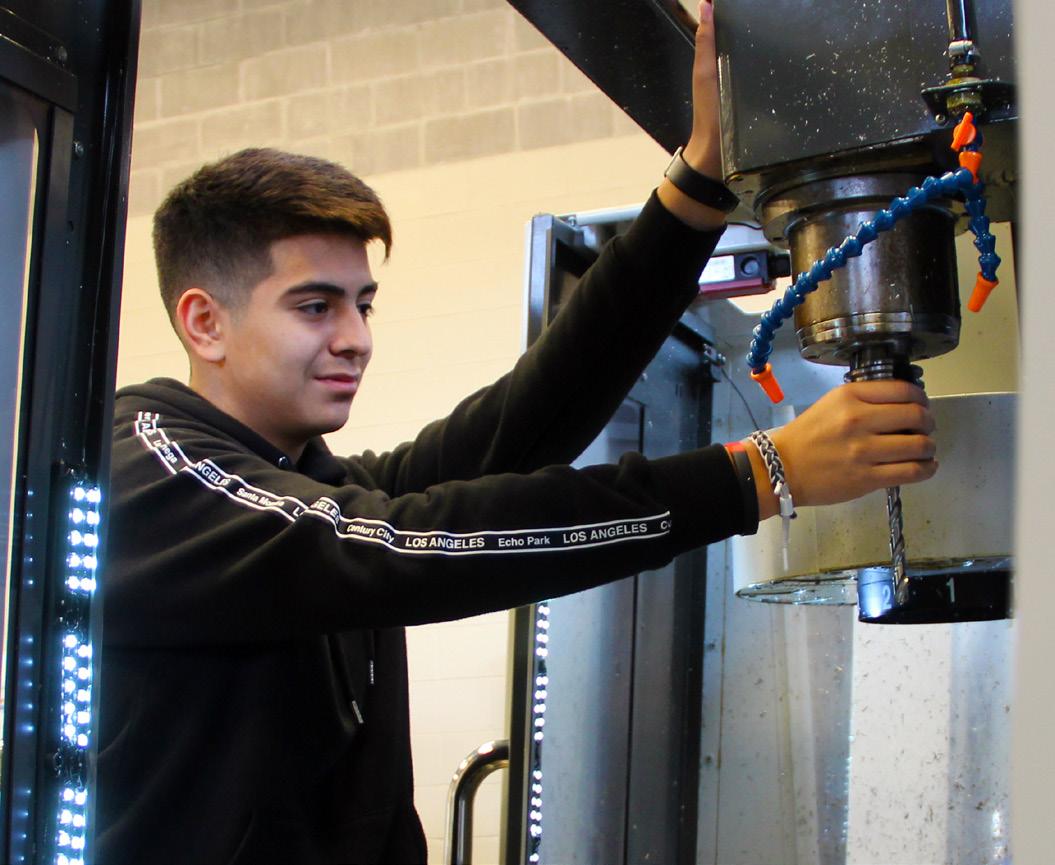
6 minute read
SECTION II : DEVELOPMENT PROCESS AND TOPIC IDENTIFICATION
NCTC’s QEP is a product of systematic and regular assessment and the strategic planning process. At the time of its development, the college was also in the process of finalizing the 2020-2025 Strategic Plan. NCTC 2020-2025 Strategic Plan’s overall theme focuses on improving students’ engagement and achievement through curricular and co-curricular methods leading to equitable opportunities for success and positive and impactful change. Aspire to the Hired helps to fulfill an important part of the college’s mission and values.
History and Demographics
In Fall 2019, a Local Trends and Gaps Analysis was conducted throughout the NCTC service area to include Cooke, Denton, Montague, and Young Counties through a partnership with Hanover Research. The survey provided an analysis of relevant student and labor market data with the primary goal to help NCTC establish the community’s needs and understand where its programs are meeting labor market needs as well as what gaps exist. A secondary goal of this report was to provide an initial analysis of the college’s retention data and post graduation performance among students who have been flagged as at-risk due to academic or socioeconomic factors.
Analysis recommendations include information based on an assessment of workforce demand indicators for Cooke, Denton, Montague, and Young Counties and student success data. Major recommendations from the Comprehensive Local Needs Assessment included: • Focus on an additional 18 high-priority occupations and one new occupational cluster for wholesale and retail trade. • Offer a core set of programs at all locations targeting universally sought-after professions, but tailor other offerings to county-specific needs. In October 2019, as a response to the Local Trends and Gaps Analysis provided by Hanover Research, NCTC conducted multiple Stakeholder Meetings by utilizing the Comprehensive Local Needs Assessment model. The assessment asked, “How can North Central Texas College ensure effective collaboration occurs between community stakeholders to make sure students are receiving the necessary skills to be successful in the workforce?” Responses included enhancing communication between employers, establishing aligned education to career pathways for students, establishing effective work-based education experiences for students, and establishing seamless technical program alignment between school districts, community colleges, and universities to prepare students for multi-entry and exit points to careers. Following these meetings, a Comprehensive Local Needs Assessment Procedure Manual for internal NCTC usage was developed to access the data and findings. These findings informed the scope and focus of the QEP by highlighting skill development needs and implementation practices. Meeting participants emphasized that written and verbal communication were not of the quality needed to represent their company or industry, and candidates often did not demonstrate this skill during the job interview stage and were not hired. Participant feedback showed that demonstration and modeling of quality communication, customer service, and professional work ethic are critical points needed by technical student graduates to enter their chosen careers. Stakeholders stated, “students are not receiving employability skills training early enough and throughout their time at NCTC. Career Services are not reaching Career and Technical Education students early and often enough to develop quality employment-ready skills that could help students as they work toward program completion and full-time entry into the local workforce.” The soft skill emphasis was not as robust as most NCTC Career and Technical Education students’ technical skills.
According to the survey results from community stakeholders (primarily employers, workforce agencies, and community-organization representatives participating in the survey), the top soft skills/employability skills that are needed for students were: communication; critical thinking; ability to learn/teachable/coachable; teamwork; and punctuality. Stakeholders repeatedly highlighted the need for graduate job-seekers to communicate effectively. Thirty-one of the 70 responders identified communication as the top soft skill needed to succeed in the workforce. The majority of the 70 responders identified communication in the top three needed soft skills. Producing teachable graduates correlates with communication skills as they need to be active listeners and communicate effectively with supervisors and colleagues to perform job tasks appropriately. Comprehensive Local Needs Assessment participants explained the need for graduate job-seekers to perform effectively on a team as a leader or participant and to utilize critical thinking and problem solving within their job duties. Stakeholders emphasized the importance of initiative and adaptability attributes, and an employee who utilizes critical thinking and problem solving skills. Professionalism was identified as essential due to poor customer service and work ethic in the current pool of employment candidates.
member experience with NCTC graduates. NCTC must respond to the needs identified in this study. Therefore, Aspire to be Hired was developed, in part, as a direct response to the research and seeks to serve NCTC students and local employers through the intentional professional development of students to meet the identified needs of these local employers.
The following employability skills were chosen as the bedrock for the QEP in response to the Community Local Needs Assessment for the Local Trends and Gaps Analysis and national data from the National Association of Colleges and Employers (NACE) and the Perkins Collaborative Resource Network. The QEP consistently defines these skills in student learning outcomes, rubrics, course outline guides for the classroom, and structured support services for workshops, individual coaching, and virtual learning opportunities. Career and technical divisions will identify which of these employability skills they will implement into their specific programs. Flexibility in employability skill implementation allows faculty to provide more focused training in skills that meet their industries needs.
Campus-Wide Involvement
The development and discovery phase for Aspire to be Hired was guided by the Provost and incorporated broad-based and multifaceted communications across all campuses, gathering input into topic selection. All college employees received an email describing the requirements of a Quality Enhancement Plan in October 2019. Included in the email was a “Call for Topic Recommendations.” All faculty and staff were encouraged to send ideas for increasing student success and improving the institution’s overall quality (Appendix A). The Provost’s office received twenty-four suggested topics from fourteen employees across the district (Appendix B).
Narrowing the Topic
In order to reduce the number of topic choices, the college conducted a survey in mid-November 2019 and collected 124 responses, representing 30% of the full-time employees. Three themes emerged: • Writing Right: Increasing students’ abilities to write in appropriate and meaningful ways across the curriculum. • Establishing a process to ensure that online class success is similar to face-to-face class success. • Focusing on soft skills and critical thinking in the curriculum for job seeking graduates. The next step was to conduct a series of QEP Open Houses scheduled across the district to present and discuss the narrower topics, provide information to the college body about the QEP, provide further insight into specific areas of interest, and identify the possible associated impact of each. These open houses met on all six NCTC campuses and online between November 18 and November 26, 2019. The topic submissions’ authors explained the three developed themes and reasoning behind each.
During the open house sessions, each topic was presented and discussed with feedback from all participants.
When discussing soft skills, a faculty member shared the following observation:
Following the college open houses, NCTC leadership created a committee to lead the remainder of the processes associated with the QEP and its development. This committee was approved by the Administration to move forward with their work.
NCTC QEP Committee
Committee members were selected based on the division and department, as represented at the district level. Having a broadbase of involvement and input gives the program multiple perspectives, feedback, and support to provide a holistic student experience.
COMMITTEEQEP
Melinda Carroll
Vice Chancellor of Enrollment Management Debbie Sharp Vice Chancellor of External Affairs Debbie Huffman Dean of Instruction for Career and Technical Education Susan Svane
Division Chair for Information Technology and Computer Science Dr. Rochelle Gregory Division Chair for English, Speech, Foreign Language Maggie Row Institutional Effectiveness Instruction Liaison and English Instructor Amy Klohn Senior Director of Completion and Career Services Donna Uptergrove Senior Director of Grants and Institutional Advancement Daphne Riddle Director of Career Services and QEP












